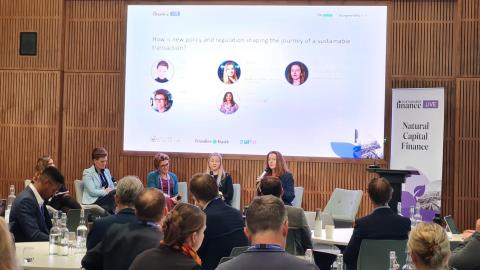Regulation and policy play a crucial role in facilitating sustainable transactions on a global scale. Various perspectives on implementing these regulations within the financial services sector were explored during the Sustainable Finance Live session.
Moderator Anna-Marie Slot, founder of Transition Value Partners, opened the session by highlighting several ESG-linked regulations, including the Corporate Sustainability Reporting Directive (CSRD), the Corporate Sustainability Due Diligence Directive (CSDDD), the Nature Restoration Law, and the Biodiversity Net Gain. She noted that many of these regulations originate from the EU, stating, “The EU has been probably the most prolific in passing laws in this space.”
Tonia Plakhotniuk from NatWest Commercial and Institutional discussed the drivers of market interest, identifying the European Sustainability Reporting Standards (ESRS) as a “game changer.” She explained that the ESRS will require banks and corporations to report on biodiversity and nature matters for the first time next year, guided by the principle of double materiality. This means companies will need to consider both the impact of nature-related risks on their financial health and the potential negative consequences of their operations on the environment.
Plakhotniuk also highlighted investor interest in sustainability, noting that discussions about nature and biodiversity now feature prominently in conversations with investors and clients.
Musidora Jorgensen, Chief Impact Officer at World Wide Generation, addressed the role of data and technology. She emphasized that leveraging data can enhance sustainability outcomes by facilitating comprehensive reporting, which not only mitigates compliance risks but also provides valuable insights for organizations.
From the asset management perspective, Carolina Minio Paluello, CEO of Arabesque AI, echoed Plakhotniuk’s sentiments, suggesting that the next generation of investors is increasingly focused on ESG considerations. “It’s starting to come into the investment world. Wealth managers are beginning to notice that when children participate in meetings, something is changing.”
Devina Paul, CFO of Zumo, provided insights from the digital assets space, asserting that current regulations are stimulating demand. However, she pointed out that scalability is lacking. Regarding biodiversity and nature credits, she remarked that these projects tend to be small, fragmented, and disparate. Paul advocated for tokenization as a solution, suggesting it can help consolidate assets, bring more liquidity to the market, and introduce elements of gamification or incentivization, all while reducing costs.
